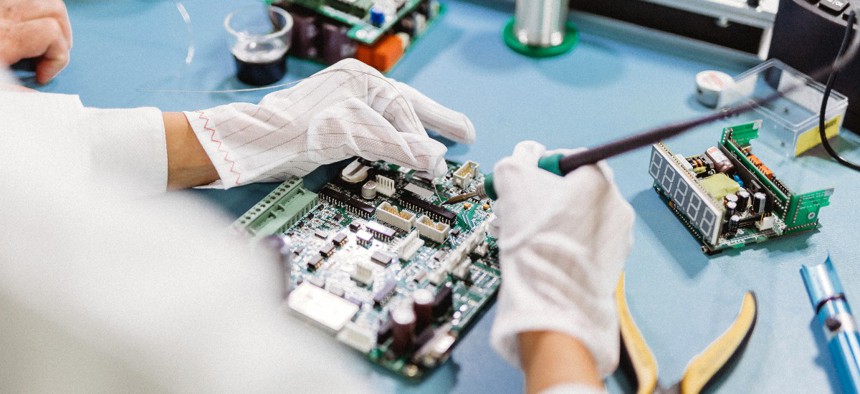House Legislation Aims to Support U.S.-Made Circuit Boards

milan2099/Getty Images
New bipartisan legislation falls in line with other bills aimed at promoting U.S. manufacturing of printed circuit boards and other critical electronic input materials.
Two bipartisan lawmakers introduced new legislation on Friday that would strengthen the production and distribution of printed circuit boards within the U.S. manufacturing industry.
Titled the Supporting American Printed Circuit Boards Act, the bill is sponsored by House Reps. Anna G. Eshoo, D-Calif., and Blake Moore, R-Utah. It serves as an incentive for American companies to manufacture printed circuit boards which are used to power a bevy of electronic devices.
It also aims to strengthen the supply chain and promote equal opportunities for businesses owned by those in minority demographics.
“The supply chain shortages for electronics are affecting every aspect of American life. Printed circuit boards are a critical part of that supply chain and are at risk of tampering vulnerabilities related to offshore production, yet the U.S. global production share of PCBs is only approximately 4%, compared to China’s 52%,” Eshoo stated. “If we want to ensure technological superiority across the global stage and strengthen national security, we need to bring PCB production back to America, which is exactly what my bipartisan bill does.”
Her bill works in tandem with the existing semiconductor production incentives spurred by U.S. tensions with China in that it encourages the domestic production of printed circuit boards. The industry is currently anchored with manufacturing facilities based in Taiwan and other Asian countries.
Some of the provisions outlined in the bill include providing a 25% tax break for the purchase of printed circuit boards made in the U.S. and financial aid for small businesses to expand production capacity of printed circuit boards.
In a bid to ensure supply chain efficiency, the bill also requires the Government Accountability Office to conduct a review of the program on a biannual basis to ensure federal funding is being allocated appropriately and that it is facilitating the desired outcomes.
“I have been encouraged by Congress’s consistent efforts to strengthen our microchips industrial base, as they are increasingly critical to our everyday technology. However, they are only part of an extensive microelectronics infrastructure,” Moore said. “As we work to reshore our manufacturing, strengthen our supply chains and prioritize national security, we are confronted by the immediate need to rebuild and bolster our entire microelectronics ecosystem.”






